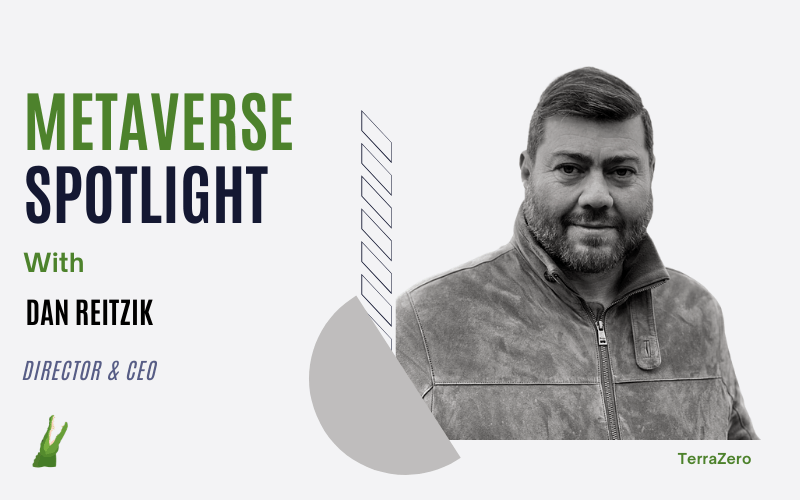The virtual real estate market is skyrocketing. Last year, Decentraland saw 21,000 real estate transactions worth $110 million while The Sandbox attracted more than $86 million in land sales in one week in November.
With wealthy celebrities, investors and fashion companies snapping up virtual lands for millions of dollars, metaverse real estate is fast becoming a top commodity. Where does that leave others who want to get a slice of the pie yet are unable to cough up full upfront payment? Enter metaverse mortgages.
Metaverse land developer TerraZero recently made headlines for issuing one of the first metaverse real estate mortgages to a client purchasing virtual land in Decentraland. The company is the brainchild of Dan Reitzik, former CEO and co-founder of blockchain and crypto mining company DMG, who left to launch TerraZero in March 2021.
In this interview, we pick his brains on the metaverse real estate market and how TerraZero is giving people the tools to enter the metaverse.
Please tell us about yourself and the story behind TerraZero.
After I left DMG, it was clear that the Metaverse was the next great use case for blockchain technologies. After speaking with a few of my colleagues about the Metaverse, and realizing that every piece of land, building, structure etc was simply an NFT residing on a blockchain, I decided I wanted to dive in – as this seems to be the next use case for blockchain technology after crypto. There is a new economy with a lifetime of opportunities here. I knew TerraZero could build the infrastructure products and services needed to empower people to get into the Metaverse.
How, when and why did you get into Metaverse real estate?
My original partner in DMG asked me to look into the metaverse when I left my previous company. In order to build anything in the metaverse, whether a storefront, game, or stage, land is required.
The questions became where do we buy the land, which world do we buy in, where in that world should we buy, and why should we buy in that location. There seemed to be so many barriers to entry in getting started. We decided at that point to create the tools to help people answer these questions and facilitate easy entry into the metaverse
What are some of the biggest Metaverse real estate projects that TerraZero has financed and/or developed?
TerraZero is in the process of building a city, or district, in Decentraland–complete with everything needed to host events, internal offices, storefronts, galleries; you can build anything you want in the Metaverse. You are only limited by your imagination. This development is in part funded by retail and office tenants, and ongoing revenues are generated also from concerts, events, advertising etc.
Who are some of your biggest clients who’ve engaged the different services your company provides?
We’ve worked with Fortune 100 companies and brands both through Metaverse consultancy and Metaverse experience fulfillment. Seeing major household-name brands want to enter the Metaverse in an elevated way shows that this is the path for advertising, community building and engagement in the future.
We provide them with real estate brokerage services, design and modeling to create their buildings/experiences, advertising and marketing in both real world and metaverse, and data analytics to better understand their audiences and to assist with future decision making
What sets your Metaverse activation solutions apart from others?
We have a studio filled with extremely talented people–programmers, game designers, 3D modelers, audio engineers… Not only does TerraZero reduce barriers to entry for people to get into the Metaverse, we create interactive, living experiences that make users want to stay and explore all the possibilities of the Metaverse worlds. It’s a compelling medium in which to work and create engagement.
As the metaverse real estate market is still unregulated, where do you see it going in the next year? Do you think it will ever be regulated?
There needs to be regulation. That’s natural–and welcomed by us. TerraZero can be on the forefront of this market, showing how people can get involved the right way from the start.
What kind of role is your company playing in the current state of the Metaverse?
The more the Metaverse grows, the more diverse tools will be needed to accommodate the needs of individuals and companies looking to connect together. More talent will get involved, too, which will be fantastic for businesses of all sizes.
More importantly, there will be more Metaverse worlds to explore. This is great, because we encourage a competitive market that’s decentralized. No one company should control the whole space and all the data therein. The metaverse has an opportunity to be built and governed by its users
How do you plan to scale TerraZero as the metaverse develops?
TerraZero is developing AMADEA, a full-service virtual real estate platform which will facilitate the buying and selling of Metaverse land, as well as land rental and mortgages on land. Amadea will continue to be bolstered by our experience fulfillment studio, which can build anything you can imagine in the Metaverse–and as more Metaverse platforms emerge, infrastructure products will need to be there so users can jump from one Metaverse to the next, seamlessly.
What other projects does TerraZero have in the pipeline for 2022?
2021 was the year everyone heard about the Metaverse. 2022 is going to be the year everyone explores the Metaverse. TerraZero is going to continue to build the products and services which will lower the barrier to entry, and our studio will continue to build compelling experiences for our clients.
Where do you think we could see the Metaverse in the near future?
Major brands and companies are going to have virtual stores and offices that mirror their real-world offices and spaces–creating global points of entry for a whole new generation of e-commerce.
I feel that an entirely new economy is forming. Before the internet, retailers had their storefront in which to attract and sell to customers. The internet enabled a second way for these companies to reach their customers. The metaverse provides a third way for brands, advertisers and retailers to reach their customers, with a uniquely different product and experience
In our spotlight series, we interview interesting players from the industry.
Stay up to date:




